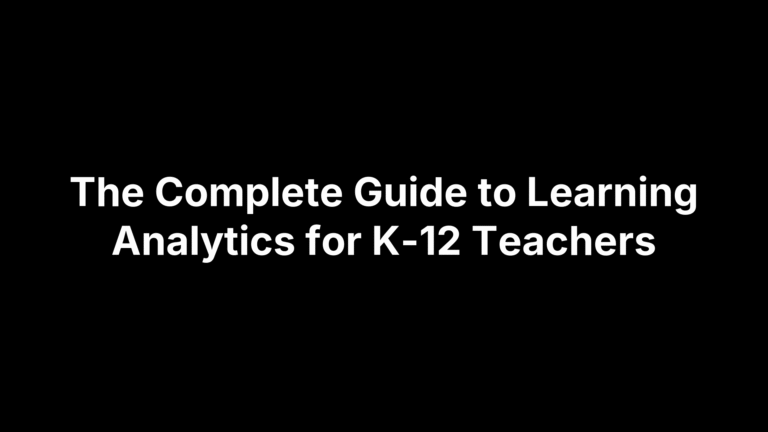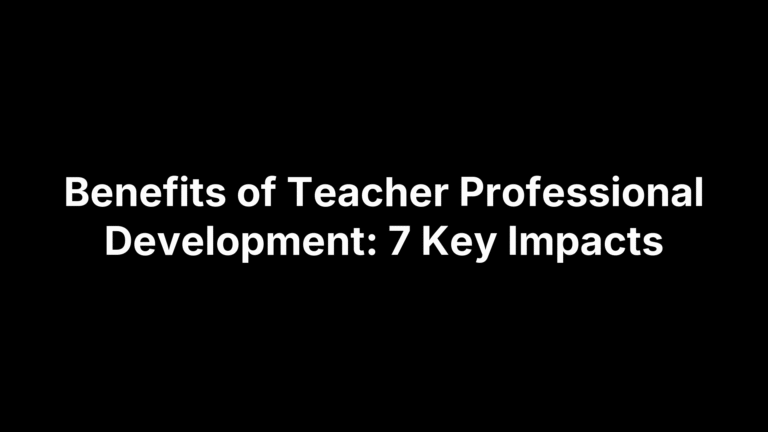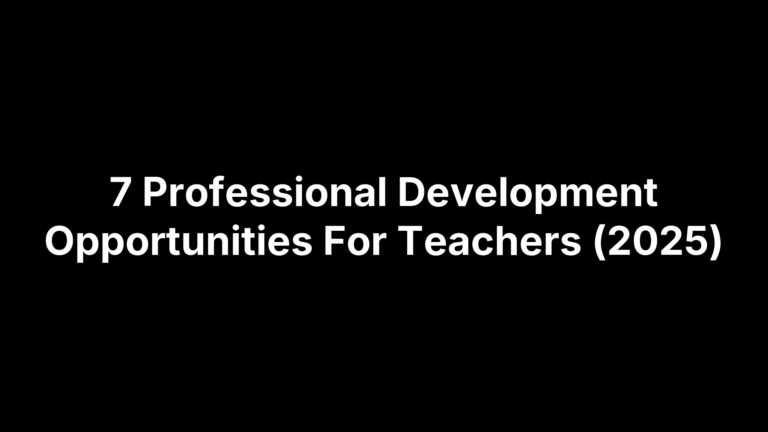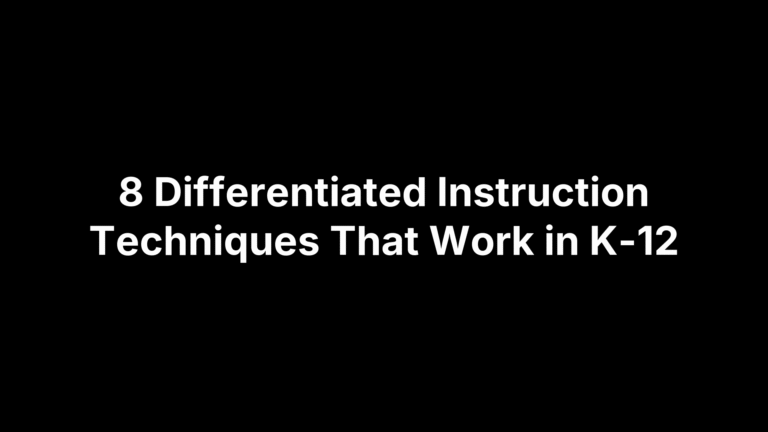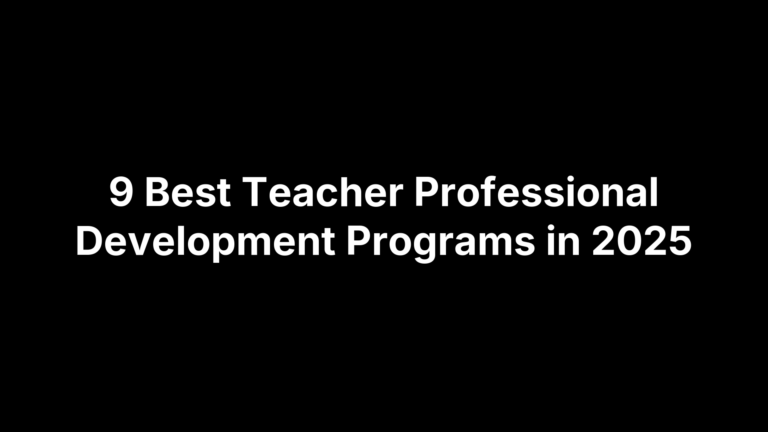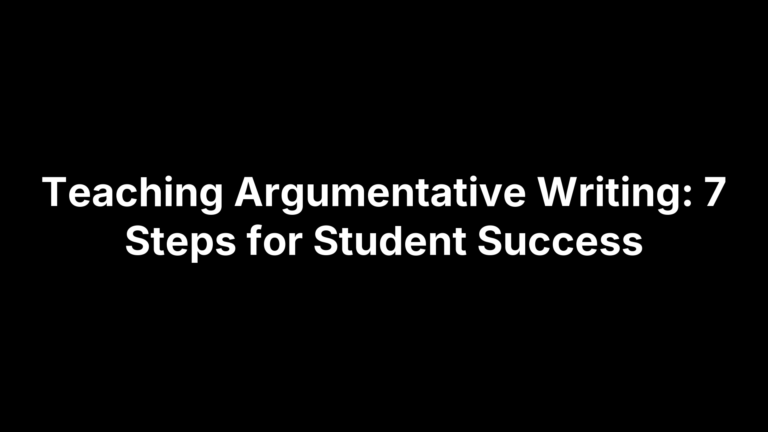Continuing Education for Teachers: Top Online Options for 2026
Most states now require teachers to earn fresh graduate credits or CEUs to renew a license and inch up the salary schedule. If you’re searching for accredited, online courses that fit an already packed 2025 calendar, start here.
Not every professional-development session pulls that weight. A genuine continuing-education course delivers transcripted university credit, graded work, and enough contact hours to satisfy state auditors; your typical after-school webinar usually hands out nothing more than a printable attendance certificate.
Because those credits appear on an official transcript, districts often treat them like mini-graduate classes: they can move you across pay lanes, strengthen promotion bids, and keep lesson plans aligned with research. The catch is that tuition climbs quickly when you guess wrong.
To save you from that headache, we rated dozens of providers against five non-negotiables: regional or national accreditation, 100 % online or truly flexible pacing, alignment with 2025 priorities such as AI literacy, SEL, and culturally responsive teaching, transparent pricing, and stellar teacher reviews. The fifteen picks below clear every bar—complete with snapshot, cost, and honest pros and cons so you can enroll confidently.
1. Teaching Channel’s Self-Paced Graduate-Level Courses
If you binge-watch Teaching Channel videos for inspiration, you’ll love their spin on formal credit. The platform teamed up with VHS Learning and several regionally accredited universities to turn those classroom clips into transcripted graduate work—making it one of the most convenient options for continuing education for teachers in 2025.
Course Snapshot & Quick Facts
- 300+ on-demand courses worth 1–3 graduate credits each
- Rolling monthly start dates; finish anytime within six months
- University transcript issued by Augustana, Morningside, or Colorado State Pueblo
- Cost: roughly $140–$415 per credit (tuition varies by partner)
- Fully online; assignments built around video analysis and classroom application
Key Skills & Competencies You’ll Gain
- Concrete, video-modeled strategies you can copy tomorrow
- AI-supported lesson-planning modules released January 2025
- Updated SEL micro-courses aligned with CASEL and ESSA evidence tiers
Why It’s One of 2025’s Top Picks
Few providers marry choice with true self-pacing this well. Add the new AI integration track and the massive video library and you’ve got a plug-and-play solution for modern, tech-infused classrooms.
Ideal For
- Busy K-12 teachers racing toward a license-renewal deadline
- Instructional coaches hunting fresh video exemplars
- Educators stacking multiple 1-credit courses for quick salary advancement
Pros & Potential Drawbacks
Pros: unmatched catalog size; university transcripts; practical, media-rich assignments.
Drawbacks: costs can climb if you collect credits piecemeal; live instructor feedback costs extra.
2. University of Phoenix – Continuing Teacher Education (CTE) Online Courses
University of Phoenix has been issuing teacher-friendly graduate credits for more than two decades, and its refreshed 2025 lineup proves the school is still listening to K-12 needs. Short, instructor-led blocks, predictable start dates, and regionally accredited transcripts make these courses an easy yes for educators who want continuing education for teachers without sacrificing evenings or weekends.
Course Snapshot & Quick Facts
- 4–6-week courses worth 3 semester credits each
- New start every two weeks; all content delivered 100 % online
- Tuition: $525–$749 per course (payment plans available)
- Structured weekly modules, discussion boards, and graded projects
- Transcript issued by University of Phoenix (Higher Learning Commission)
Trending 2025 Course Highlights
- “AI Literacy in K–12 Classrooms”
- “Trauma-Informed Pedagogy for Diverse Learners”
- “Digital Assessment & Analytics”
Accreditation & Transferability
HLC accreditation means most state DOEs accept the credits for license renewal or salary advancement; always double-check with district HR before enrolling.
Best Suited For
- Teachers who like clear weekly milestones
- Educators wanting instructor feedback and peer interaction
- Professionals needing quick, transcripted credits
Pros & Cons Cheat Sheet
Pros: reliable brand recognition; frequent start dates; cohort support; straightforward transcript ordering.
Cons: higher per-credit price tag; weekly deadlines can feel rigid despite the online format.
3. Credits for Teachers – 3-Credit, Self-Paced Courses
If you’d rather knock out a full three-credit block without weekly checkpoints, Credits for Teachers keeps things simple: enroll today, finish anytime within six months, and download a university transcript the moment you’re done.
Course Snapshot & Quick Facts
- 70+ on-demand courses
- Exactly 3 graduate credits each
- Partner universities: Colorado State–Pueblo, Augustana, Drake, more
- Tuition hovers around $429 per course
- Six-month access window; no start dates to track
- 100 % online with project-based assessments
Unique Course Options for 2025
- “Harnessing ChatGPT for Differentiation”
- “Climate Literacy Across the Curriculum”
- “Project-Based Learning 2.0” with updated rubric banks
Salary Advancement Potential
Many districts bump pay in three-credit chunks, so a single course can trigger the next lane jump.
| Graduate Hours | Common Lane Change* |
|---|---|
| 3 credits | +1 step |
| 6 credits | +2 steps |
*Check your negotiated agreement.
Pros & Cons
Pros: user-friendly portal, bundle discounts, generous pacing.
Cons: no peer interaction, self-motivation required, credit limited to partner schools.
4. University of North Dakota Online – Educator Professional Development
UND has quietly become a go-to bargain for continuing education for teachers who want true graduate credit without a luxury-brand price tag. Every course sits inside the same Blackboard shell UND uses for degree programs, so you’re getting university-level rigor—just condensed into bite-sized, self-paced modules you can finish over a lunch break or stretch across nine months.
Course Snapshot & Quick Facts
- 120+ online courses, 1–3 graduate credits each
- Flat $149 per credit (no hidden tech fees)
- Self-paced; up to 9 months to submit final project
- Transcript from the University of North Dakota, Higher Learning Commission accredited
Cutting-Edge Additions for 2025
- “Data-Driven Decision Making with AI Dashboards”
- “Indigenous Perspectives in Curriculum Design”
- ISTE-aligned refresh on digital citizenship and privacy
Certification & Licensing Notes
UND credits meet Act 48 in Pennsylvania (3 credits = 90 hours toward the required 180) and count toward South Carolina’s 120-renewal-credit rule as graduate coursework. Always run course numbers by your HR office before you click “enroll.”
Ideal For & Caveats
Great for teachers hunting budget-friendly credits or spacing coursework around family life. Heads-up: transcript processing stretches to 2–3 weeks during summer crunch, so plan ahead if your renewal deadline looms.
5. Fresno Pacific University – Distance Learning Courses for K-12 Teachers
California-based Fresno Pacific University has been a budget favorite for decades, and its 2025 catalog keeps that streak alive. If you need transcripted credits but crave maximum scheduling freedom, these distance-learning courses hit the sweet spot for continuing education for teachers.
Course Snapshot & Quick Facts
- 350+ online courses
- 1–4 semester units each (≈15–60 contact hours)
- $80–$120 per unit; pay only for the units you need
- Finish anytime within 12 months of enrollment
- Regionally accredited by WASC Senior College & University Commission
Signature 2025 Offerings
- “Advanced Universal Design for Learning”
- “Gamified Formative Assessment”
- “Restorative Practices in the Secondary Classroom”
Learning Experience Overview
Expect an independent-study format: curated readings or textbooks, practical application projects, and individualized instructor feedback via email—no Zoom meetings, no fixed deadlines.
Pros & Cons
Pros: generous one-year window, low per-unit price, university transcript.
Cons: textbooks often an extra expense, feedback can take several days, minimal peer interaction.
6. University of San Diego PCE – Online & Hybrid PD Units
USD’s Professional and Continuing Education (PCE) division squeezes graduate-level substance into compact, five-to-nine-week chunks. Because each class appears on a WSCUC-accredited transcript, California teachers routinely use the credits for salary advancement and license renewal.
Course Snapshot & Quick Facts
- 50+ online or hybrid courses
- 3 continuing-education units (CEUs) = 3 semester credits
- Tuition: $79 per unit (≈ $237 per course)
- Duration: 5–9 weeks, with evening assignment deadlines
- Rolling enrollment; hybrid seats limited
Features New in 2025
Live virtual workshops on AI ethics now bookend every STEM course, the LMS finally works on phones without pinching and zooming, and optional micro-credential badges let you stack evidence toward larger certificates.
Best For
California educators chasing quick lane changes, STEM/STEAM teachers who appreciate hands-on labs, and anyone who prefers a set finish line to semester-long drags.
Pros & Possible Drawbacks
Pros: short timeline, interactive cohort discussions, respected regional accreditation.
Drawbacks: fewer start dates than pure MOOCs, hybrid sections cost more and require one Saturday on campus.
7. CE Credits Online – Salary Advancement Courses with District Partnerships
When your contract specifies “pre-approved providers only,” CE Credits Online is a safe bet. The company has spent two decades brokering direct agreements with large districts, so its graduate-level courses slide cleanly into salary-differential payroll systems and meet most state renewal rules for continuing education for teachers.
Course Snapshot & Quick Facts
- Self-paced, entirely online
- 3–4 graduate credits per course
- Tuition: $450–$525 all-in
- University partners: Adams State, UMass Global, UND
- Six-month enrollment window; rolling admission
Stand-Out 2025 Curriculum
- “Culturally Relevant Teaching for Multilingual Learners”
- “AI-Powered Assessment Design”
- “Mindfulness Strategies for Teacher Wellness”
District & Union Partnerships
Automatic grade entry for NYC DOE ASPDP, LAUSD salary point credit, and negotiated discounts with Clark County and Chicago Teachers Union make paperwork almost painless.
Pros & Cons
Pros: pre-approved in dozens of major districts; solid university transcripts; bundle savings.
Cons: dated website UX; some modules rely heavily on static PDFs; limited peer interaction.
8. Learners Edge – Graduate Credits From Accredited University Partners
Learners Edge pairs a clean, mobile-friendly platform with regionally accredited university partners, so the credits you earn travel well across district salary lanes and state renewal systems. Everything is asynchronous, yet the course flow still feels purposeful thanks to weekly checkpoints and optional peer forums.
Course Snapshot & Quick Facts
- 160+ online courses, each worth 3 graduate credits
- Eight-week terms; start dates every month
- Cost: $425–$489 per course (no tech fees)
- Transcripts issued by Augustana University, American College of Education, or UMass Global
2025 Hot-Topic Courses
- “Inclusive STEM Pathways for Girls”
- “Chatbot Moderation & Digital Citizenship”
- “Trauma-Responsive Classroom 2.0” with updated MTSS resources
Learning Model & Support
Expect weekly reflection prompts, low-stakes quizzes, and a capstone project you can repurpose in class. Instructor TAs hold virtual office hours, and a 24-hour help desk tackles tech hiccups.
Pros & Cons
Pros: supportive peer community, clear rubrics, transcripts ship fast.
Cons: fixed eight-week schedule limits flexibility; refunds only within 72 hours of enrollment.
9. PBS TeacherLine – Standards-Aligned Online PD
Need proof that a low-cost course can still meet state standards? PBS TeacherLine checks that box by pairing its award-winning videos with instructor-facilitated discussions and optional graduate credit. If you’re after bite-sized continuing education for teachers that still earns official hours, this catalog is worth bookmarking.
Course Snapshot & Quick Facts
- 30+ facilitated courses (15, 30, 45 hours) plus 90+ self-paced modules
- CEUs included; university transcript available for an extra fee
- Price range: $49–$199 (facilitated sections slightly higher)
- Runs 6–8 weeks with weekly discussion posts and practical projects
Unique Assets
Lessons are built around PBS media clips, ready-made lesson plans, and standards tags, so you can plug resources straight into tomorrow’s slideshow.
2025 Course Highlights
- “Teaching Media Literacy in the Age of Deepfakes”
- “Early Childhood Computational Thinking” with ScratchJr labs
Pros & Cons
Pros: budget friendly, multimedia-rich, strong STEM and literacy focus.
Cons: facilitated courses have limited start dates; graduate credit requires a separate registration and fee.
10. PDI Online (Professional Development Institute) – Practical Strategies Courses
Need credits that translate straight into day-one classroom tweaks? PDI’s streamlined, text-based courses keep theory brief and actionable ideas front-and-center, all while issuing university credit teachers can bank for lane changes.
Course Snapshot & Quick Facts
- 45 instructional hours per course
- 3 semester units recorded through UC San Diego Extension (WSCUC accredited)
- Flat tuition: $299—no extra tech or textbook fees
- Self-paced; start any day and submit work within 12 months
- Completion certificate plus mailed UCSD transcript
2025 Course Additions
- “Neuroscience & Learning”
- “AI-Enhanced Reading Intervention”
- “Next-Gen NGSS Inquiry Labs”
Course Structure
Each module mixes concise readings, short video demos, and auto-graded quizzes. You’ll finish with an application assignment—usually a lesson plan or reflective essay—emailed to your instructor for targeted feedback.
Pros & Cons
Pros: budget-friendly price, respected UCSD transcript, no mandatory discussions, mobile-friendly PDFs for offline reading.
Cons: content is text heavy, zero peer community, feedback can take up to a week during peak seasons.
11. Stanford Online – GSE Professional Certificate Programs
Stanford’s Graduate School of Education wraps Ivy-League rigor into digestible online sequences, giving continuing education for teachers a prestige upgrade without forcing them to relocate to Palo Alto.
Course Snapshot & Quick Facts
- Four-course certificate pathways
- 2 graduate credits per course (8 total)
- Fully online, optional live webinars with GSE faculty
- Tuition: $299 per course; pay-as-you-go model
- Finish each course in 6–8 weeks; cohorts start quarterly
2025 Focus Tracks
- Equity-Centered School Leadership
- Design Thinking for Educators
- Updated “How to Learn Math” suite with AI-generated practice sets
Credit & Prestige
Credits appear on an official Stanford University continuing-studies transcript. Districts often accept them for professional-development hours, though some won’t count them toward salary lanes—check before you enroll.
Pros & Cons
Pros: brand recognition, faculty-led webinars, research-backed content, manageable workload chunks.
Cons: not universally lane-eligible, higher reading load than typical PD, limited start dates.
12. Coursera/University of Illinois – “Foundations of Online Teaching” Specialization
This four-course Coursera sequence from the University of Illinois Urbana-Champaign turns massive open online learning into transcripted graduate credit that districts recognize. If you thrive on bite-sized videos, peer review, and complete calendar freedom, it’s one of the most flexible continuing-education options on this list.
Course Snapshot & Quick Facts
- Four content courses plus a capstone project
- Self-paced; finish in 1–3 months or stretch longer
- Coursera subscription: $49 / month
- Optional university credit: $600 per credit (ACE-recommended transfer)
- Mobile-friendly platform, weekly auto-graded quizzes, and peer-graded assignments
2025 Updates
- Generative-AI peer-review assistant that flags rubric gaps
- New module on Universal Design for Online Learning with VR case studies
Certification Pathways
Free MOOC certificates satisfy many districts’ PD-hour logs. Teachers needing lane advancement can request an official UIUC transcript after completing all four courses and paying the credit fee—double-check acceptance with HR before betting on the upgrade.
Pros & Cons
Pros: ultra-low upfront cost, pause-anytime pacing, robust discussion forums, content aligned with ISTE 2025 standards.
Cons: credit conversion paperwork is tedious, subscription fees add up if you linger, minimal live instructor interaction.
13. edX/Harvard – “Data Wise: Using Assessment to Improve Instruction”
Harvard’s renowned Data Wise protocol has helped thousands of schools turn raw test scores into actionable plans. The self-paced edX version keeps that brainpower affordable—and the 2025 refresh folds in timely AI tools without diluting the core cycle.
Course Snapshot & Quick Facts
- 12 weeks; audit free or
$199for verified certificate - Optional 2 graduate credits via Harvard Extension (
$995) - 4-hour weekly workload; runs entirely online with live office-hour webinars
2025 Enhancements
- Sandbox AI dashboards that let you practice filtering fake data noise
- New post-pandemic case studies featuring hybrid learning metrics
Ideal Audience
Instructional coaches, PLC leads, or administrators building a campus data culture for continuing education for teachers initiatives.
Pros & Cons
Pros: Ivy-League pedigree, research depth, reusable data templates, flexible pacing.
Cons: Heavy reading load, credit cost high, some districts count certificate as PD hours only.
14. Digital Promise Micro-credentials – Stackable Badges for Educators
Badges aren’t just flair anymore; Digital Promise’s 600-plus micro-credentials let teachers prove mastery of discrete skills and, in many states, bank the evidence for continuing-education units (CEUs).
Program Snapshot & Quick Facts
- Competency-based: submit artifacts, get peer-reviewed
- Most badges free; a few cost $25–$49 for verification
- Self-paced; complete in a weekend or over months
- CEU conversion depends on state/district policy
2025 Stand-Out Micro-credentials
- AI Prompt Engineering for Classroom Use
- Culturally Responsive Feedback Loops
- Student-Led Climate Action Projects
How Credit Works
Educators can bundle badges into graduate credit through partner universities—e.g., 12 approved micro-credentials = 3 credits at SNHU or Capella—then apply those credits toward license renewal or salary lanes.
Pros & Cons
Pros: competency-based, personalized pathway, often free, instantly shareable badges.
Cons: paperwork to translate into credits, not universally accepted for pay advancement.
15. Canvas Network – Free & Low-Cost MOOC PD for Teachers
Already comfortable with Canvas in your own classroom? Canvas Network lets you flip to the student side for professional growth without paying grad-school tuition. Most courses are massive open online courses (MOOCs) that run a few weeks, cost nothing to join, and still hand out verifiable badges teachers can log as CEUs.
Course Snapshot & Quick Facts
- 4–8-week courses, asynchronous
- Free enrollment; optional CEU certificate via Badgr for a small fee
- Not transcripted for graduate credit unless cross-listed with a partner university
- Global educator cohorts; frequent start dates
2025 Course Highlights
- “Gamification & Game-Based Learning”
- “Intro to XR/AR in the Classroom”
- SEL micro-modules developed with Panorama Education
Learning Experience
Courses live inside the familiar Canvas LMS, with weekly video lectures, discussion boards, and auto-graded checks for understanding. Badges appear instantly in your Badgr wallet and can be forwarded to many state PD portals.
Pros & Cons
Pros: zero-cost entry, flexible pacing, lively international forums, badges issued instantly.
Cons: certificates aren’t university credits, acceptance for salary lanes varies widely, no instructor feedback in self-paced offerings.
A Few Final Thoughts
Which of these courses is “best” ultimately comes down to three things only you can answer:
- Does the credit type satisfy your state licensure or Act 48/renewal rules?
- Will it move you toward a pay-lane bump or a skill you genuinely need?
- Does the pacing and format fit the way you like to learn—independent grind, live cohort, or something in between?
Before you swipe a school-purchase card, run the course number past your district HR office or state DOE portal. A two-minute email now is cheaper than finding out in June that your shiny new transcript won’t count. While you’re double-checking, peek at the syllabus for 2025 must-haves—AI literacy, data analytics, inclusive and culturally responsive practice, and updated SEL frameworks. Courses that weave those threads together are far more likely to stay relevant through your next renewal cycle.
Ready for the next step? Browse more classroom-tested strategies and AI-powered teacher tools at The Cautiously Optimistic Teacher and keep the momentum rolling.
